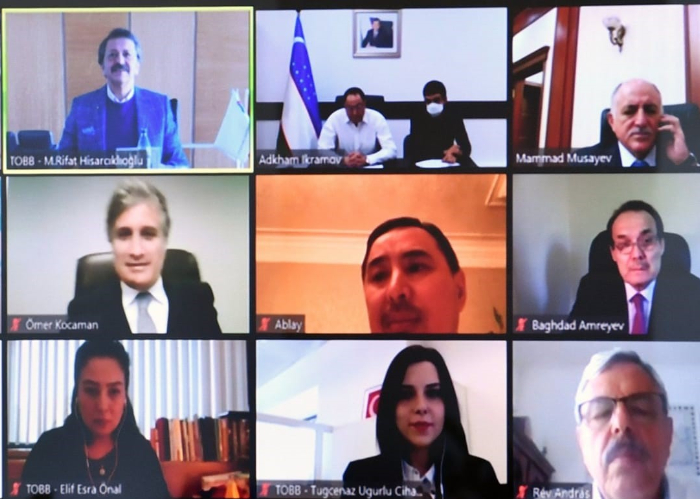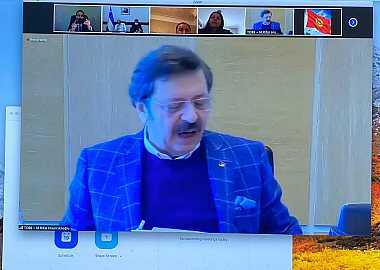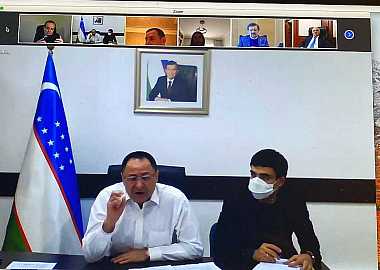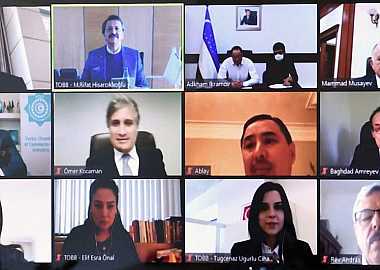Turkic Council convened a videoconference meeting of Heads of the Turkic Chamber of Commerce and Industries of the Turkic Council on 7th April 2020.
The video conference was attended by Secretary General of the Turkic Council, H.E. Baghdad Amreyev, President of the Union of Chambers and Commodity Exchanges of Turkey (TOBB) and President of the Turkic Chamber of Commerce and Industry (TCCI), Mr. Rifat Hisarcıklıoğlu, President of the National Confederation of Entrepreneurs (Employers) Organization of the Republic of Azerbaijan (ASK), Mr. Mammad Musayev, Chairman of The National Chamber of Entrepreneurs of the Republic of Kazakhstan “Atameken”, Mr.Ablay Mirzahmedov, Vice-Chairwoman of the Chamber of Commerce and Industry of the Kyrgyz Republic, Mrs. Rima Apasova, Chairman of the Chamber of Commerce and Industry of the Republic of Uzbekistani Dr. Adham Ikramov, President of Chamber of Commerce and Industry of Hungary, Mr. Andras Rev and Deputy Secretary General of the Turkic Council, Dr. Omer Kocaman.
During the video conference, the Heads of the business communities of the Member and Observer States exchanged information on the current state of affairs and measure taken by the governments to prevent undesirable repercussions of the COVID-19 pandemic; discussed the role that the Chambers and private sectors could play in the fight against coronavirus and prepared recommendations aiming at preparing national economies and businesses for the impacts of global pandemic as well as for the post-pandemic era.
In his speech Secretary General Baghdad Amreyev emphasized that the Turkic Council Member and Observer States deserve praise for demonstrating strong solidarity and cooperation in the fight against coronavirus pandemic. From a multilateral perspective, since the earliest stages of the fight against the virus, the Turkic Council countries have carried out a series of close contacts at the bilateral level to coordinate their mutual steps, as well as supplied medical and technical assistance to each other.
Secretary General underlined the necessity of conducting joint measures to minimize the economic cost of this pandemic in member countries. Noting that there will be a grim economic picture left behind and a major economic slowdown is expected worldwide, he stated that the Turkic Council countries need to carry out joint efforts and take common measures for the post-crisis period.
With this understanding, in the aftermath of such a testing period, the Secretary General suggested the preparation of a set of proposals enabling our countries to collectively respond to such global crises through establishing necessary anti-crisis mechanisms that he will present for the consideration of the Heads of the States/Governments of the Turkic World at the extraordinary Summit in a video conference format, to be held in coming days.
President of Union of Chambers and Commodity Exchanges of Turkey (TOBB) and President of TCCI, Mr. Rifat Hisarcıklıoglu, exchanged the measures taken by the Turkish Government and role of TOBB in supporting business communities in Turkey. He stated that through establishing public private partnership mechanisms, TOBB analyzed the needs and challenges of the private sector. Based on this information the government developed the package of measures, which consist of the fiscal policy (tax and social security premium payments in the sectors most affected by the crisis were postponed for 6 months without interest, the rent payments of the private sector in the places where public institutions own the property were left to 3 months late) funding (postponement of firm’s credit lines up to 3 month, doubling the capacity of Credit Guarantee Fund's, additional loan opportunities for firms) and employment (scope of the Public Work Shortcuts Expanded, 60% of the gross salary of the company employees will be covered for 3 months).
President of TOBB and TCCI, Mr.Rifat Hisarcıklıoğlu also emphasized that the current situation required adoption of necessary urgent measures on facilitating customs procedures and connectivity among the Turkic Council Members by issuing necessary permits in a timely manner and lowering the transit fees so that this commercial route would continue to operate without any interruptions. He also emphasized that in the post-pandemic era, agriculture and animal husbandry would come to forefront as critical sectors that the Turkic Council countries should prioritize further. Moreover, he exchanged views and recommendations regarding the TCCI’s activities planned for the year of 2020.
President of the National Confederation of Entrepreneurs Organization of the Republic of Azerbaijan (ASK), Mr. Mammad Musayev informed the participants about the measures taken in Azerbaijan in connection with the virus. He said that the government of Azerbaijan has adopted a package of measures which accounts for $1.5 billion and aimed at reducing the negative impact of COVID-19 outbreak on the national economy, the entrepreneurship and banking sectors, as well as strengthening the social protection of the people. These include exemption of micro-enterprises from paying simplified tax for a certain period of time; exemption from income tax in a specific amount and for a specific term; value-added tax (VAT) exemption for some food and medicinal products, as well as the raw materials that are necessary for making such stuff.
In addition, President of ASK stressed the need for advance preparations of the national economies and enterprises of Turkic Council Member States to future impacts of the COVID-19 pandemic. In this context, he proposed the discussion and adoption of the relevant Action Plan within the TCCI which will include: preparation of overwhelming package of common actions and measures for recovering national economies for post-pandemic period, enlarging uninterrupted commercial links between member states through open transport lines, e-commerce and etc., joint preventive measures to ensure sustainable food security in member states, exchange of experience on support measures of member countries for the pandemic and post-pandemic periods via various platforms.
Chairman of The National Chamber of Entrepreneurs of the Republic of Kazakhstan (Atameken), Mr. Ablay Mirzahmedov briefed the participants on the measures implemented by the Government of Kazakhstan to support small and medium businesses for the period of emergency, including tax preferences, deferrals on payments and loans. He also noted that among other measures to support SMEs in the most affected sectors of the economy (catering, some sectors of trade, transport services, consulting services, IT-sector, hotel business, tourism, etc.), payment of taxes and other payments from the wage fund are abolished for six months, standstill on bank loan repayments by small and medium-sized businesses for the duration of the state of emergency, as well as a deferral of payment of all types of taxes and other obligatory payments for a period of three months. Kazakhstan allocated $10 billion towards these anti-crisis measures throughout the country, including $2.5 billion for measures to boost agriculture sector.
Referring to the relevant cooperation within the framework of Turkic Council, the Chairman of “Atameken” stated that the Turkic States should concentrate on adapting their economies and private sectors into the emerging conditions of the post-pandemic, such as establishing health and pharmaceutical manufacture. Measures promoting IT technology and digital economy especially online trading and e-learning systems should be introduced to larger audiences. The governments should identify the sectors that will be driving force of the economies after pandemic.
Chairman of the Chamber of Commerce and Industry of Uzbekistan (CCIU) Dr. Adkham Ikramov, touched upon the measures taken in Uzbekistan to mitigate the negative impact of coronavirus pandemic on national economy, such as provide tax holidays (for up to 6 months) and preferences for credit debt to enterprises, allocation of budget loans to industries most affected by coronavirus (hotel business, transport and logistics sector, catering sector, foreign trade enterprises).
He also exchanged views and ideas towards the post-crisis containment measures to prevent greater economic loss after a pandemic period could be implemented in the Turkic Council Member States. Chairman A.Ikramov highly appreciated the role of the Member States in facilitating the supply chain among the countries and particularly the importance of Trans-Caspian International Transportation Route. He emphasized on the necessity of strengthening cooperation in times of global crises such as coronavirus in transport and logistics sectors among Turkic Council countries through railway and road freight, online customs regulations, government support of all type of businesses regardless of their sizes including micro, small and medium-sized. The measures of the International Labor Organization, which consist of protecting employees, stimulating economy and labor and supporting employment and income, were reminded as adequate solutions to tackle the crisis.
Vice-Chairwoman of the Chamber of Commerce and Industry of the Kyrgyz Republic, Mrs. Rima Apasova gave an account of the measures undertaken by the Kyrgyz Government to support the SMEs from the repercussions of the current pandemic, by providing them with the much needed financing, while also playing an enormous role in maintaining jobs. She also shared with participants additional recommendations of the Kyrgyz CCI towards the support measures to private sector.
Vice-Chairwoman of Kyrgyzstan CCI underlined the necessity of taking serious measures for inclusion in the state program to support entrepreneurs in connection with the emergency measures to combat the new epidemic, such as financial support (subsidies, soft loans) to enterprises under extreme conditions, state support in the form of subsidies through state banks to food industry producers, facilitating the smooth transit of vital goods (via launching green corridor at customs), deferrals of tax reports for individuals engaged in entrepreneurial activities, tax exemptions and social contributions to company employees, development of biotechnology sector.
During the video conference President of Hungarian Chambers of Commerce and Industry, Mr.Andras Rev expressed the gratitude to the Turkic Council Member States, particularly to Uzbekistan and Turkey for their support and assistance to Hungary. Then he mentioned about a range of economic measures implemented by Hungarian government in order to ameliorate the negative effects of the coronavirus outbreak, with a special focus on vulnerable sectors such as tourism.
Furthermore, President of Hungarian CCI emphasized the crucial importance of establishing a special joint fund that might be also used for the recovery of the economies of all Turkic Council countries, from which investments would be financed in such sectors as healthcare, agriculture and food.
The participants highly expressed appreciation with the important role of the Turkic Council in contributing to the regional cooperation against the current challenges and necessity to continue carry out joint efforts and take common measures for the post-crisis period.
The policy recommendations proposed by the representatives of the business communities of the Member and Observer States during the meeting will be presented to the Heads of States/Governments during the Extraordinary Video Summit of the Turkic Council, which is will be convene in coming days.
The video conference was attended by Secretary General of the Turkic Council, H.E. Baghdad Amreyev, President of the Union of Chambers and Commodity Exchanges of Turkey (TOBB) and President of the Turkic Chamber of Commerce and Industry (TCCI), Mr. Rifat Hisarcıklıoğlu, President of the National Confederation of Entrepreneurs (Employers) Organization of the Republic of Azerbaijan (ASK), Mr. Mammad Musayev, Chairman of The National Chamber of Entrepreneurs of the Republic of Kazakhstan “Atameken”, Mr.Ablay Mirzahmedov, Vice-Chairwoman of the Chamber of Commerce and Industry of the Kyrgyz Republic, Mrs. Rima Apasova, Chairman of the Chamber of Commerce and Industry of the Republic of Uzbekistani Dr. Adham Ikramov, President of Chamber of Commerce and Industry of Hungary, Mr. Andras Rev and Deputy Secretary General of the Turkic Council, Dr. Omer Kocaman.
During the video conference, the Heads of the business communities of the Member and Observer States exchanged information on the current state of affairs and measure taken by the governments to prevent undesirable repercussions of the COVID-19 pandemic; discussed the role that the Chambers and private sectors could play in the fight against coronavirus and prepared recommendations aiming at preparing national economies and businesses for the impacts of global pandemic as well as for the post-pandemic era.
In his speech Secretary General Baghdad Amreyev emphasized that the Turkic Council Member and Observer States deserve praise for demonstrating strong solidarity and cooperation in the fight against coronavirus pandemic. From a multilateral perspective, since the earliest stages of the fight against the virus, the Turkic Council countries have carried out a series of close contacts at the bilateral level to coordinate their mutual steps, as well as supplied medical and technical assistance to each other.
Secretary General underlined the necessity of conducting joint measures to minimize the economic cost of this pandemic in member countries. Noting that there will be a grim economic picture left behind and a major economic slowdown is expected worldwide, he stated that the Turkic Council countries need to carry out joint efforts and take common measures for the post-crisis period.
With this understanding, in the aftermath of such a testing period, the Secretary General suggested the preparation of a set of proposals enabling our countries to collectively respond to such global crises through establishing necessary anti-crisis mechanisms that he will present for the consideration of the Heads of the States/Governments of the Turkic World at the extraordinary Summit in a video conference format, to be held in coming days.
President of Union of Chambers and Commodity Exchanges of Turkey (TOBB) and President of TCCI, Mr. Rifat Hisarcıklıoglu, exchanged the measures taken by the Turkish Government and role of TOBB in supporting business communities in Turkey. He stated that through establishing public private partnership mechanisms, TOBB analyzed the needs and challenges of the private sector. Based on this information the government developed the package of measures, which consist of the fiscal policy (tax and social security premium payments in the sectors most affected by the crisis were postponed for 6 months without interest, the rent payments of the private sector in the places where public institutions own the property were left to 3 months late) funding (postponement of firm’s credit lines up to 3 month, doubling the capacity of Credit Guarantee Fund's, additional loan opportunities for firms) and employment (scope of the Public Work Shortcuts Expanded, 60% of the gross salary of the company employees will be covered for 3 months).
President of TOBB and TCCI, Mr.Rifat Hisarcıklıoğlu also emphasized that the current situation required adoption of necessary urgent measures on facilitating customs procedures and connectivity among the Turkic Council Members by issuing necessary permits in a timely manner and lowering the transit fees so that this commercial route would continue to operate without any interruptions. He also emphasized that in the post-pandemic era, agriculture and animal husbandry would come to forefront as critical sectors that the Turkic Council countries should prioritize further. Moreover, he exchanged views and recommendations regarding the TCCI’s activities planned for the year of 2020.
President of the National Confederation of Entrepreneurs Organization of the Republic of Azerbaijan (ASK), Mr. Mammad Musayev informed the participants about the measures taken in Azerbaijan in connection with the virus. He said that the government of Azerbaijan has adopted a package of measures which accounts for $1.5 billion and aimed at reducing the negative impact of COVID-19 outbreak on the national economy, the entrepreneurship and banking sectors, as well as strengthening the social protection of the people. These include exemption of micro-enterprises from paying simplified tax for a certain period of time; exemption from income tax in a specific amount and for a specific term; value-added tax (VAT) exemption for some food and medicinal products, as well as the raw materials that are necessary for making such stuff.
In addition, President of ASK stressed the need for advance preparations of the national economies and enterprises of Turkic Council Member States to future impacts of the COVID-19 pandemic. In this context, he proposed the discussion and adoption of the relevant Action Plan within the TCCI which will include: preparation of overwhelming package of common actions and measures for recovering national economies for post-pandemic period, enlarging uninterrupted commercial links between member states through open transport lines, e-commerce and etc., joint preventive measures to ensure sustainable food security in member states, exchange of experience on support measures of member countries for the pandemic and post-pandemic periods via various platforms.
Chairman of The National Chamber of Entrepreneurs of the Republic of Kazakhstan (Atameken), Mr. Ablay Mirzahmedov briefed the participants on the measures implemented by the Government of Kazakhstan to support small and medium businesses for the period of emergency, including tax preferences, deferrals on payments and loans. He also noted that among other measures to support SMEs in the most affected sectors of the economy (catering, some sectors of trade, transport services, consulting services, IT-sector, hotel business, tourism, etc.), payment of taxes and other payments from the wage fund are abolished for six months, standstill on bank loan repayments by small and medium-sized businesses for the duration of the state of emergency, as well as a deferral of payment of all types of taxes and other obligatory payments for a period of three months. Kazakhstan allocated $10 billion towards these anti-crisis measures throughout the country, including $2.5 billion for measures to boost agriculture sector.
Referring to the relevant cooperation within the framework of Turkic Council, the Chairman of “Atameken” stated that the Turkic States should concentrate on adapting their economies and private sectors into the emerging conditions of the post-pandemic, such as establishing health and pharmaceutical manufacture. Measures promoting IT technology and digital economy especially online trading and e-learning systems should be introduced to larger audiences. The governments should identify the sectors that will be driving force of the economies after pandemic.
Chairman of the Chamber of Commerce and Industry of Uzbekistan (CCIU) Dr. Adkham Ikramov, touched upon the measures taken in Uzbekistan to mitigate the negative impact of coronavirus pandemic on national economy, such as provide tax holidays (for up to 6 months) and preferences for credit debt to enterprises, allocation of budget loans to industries most affected by coronavirus (hotel business, transport and logistics sector, catering sector, foreign trade enterprises).
He also exchanged views and ideas towards the post-crisis containment measures to prevent greater economic loss after a pandemic period could be implemented in the Turkic Council Member States. Chairman A.Ikramov highly appreciated the role of the Member States in facilitating the supply chain among the countries and particularly the importance of Trans-Caspian International Transportation Route. He emphasized on the necessity of strengthening cooperation in times of global crises such as coronavirus in transport and logistics sectors among Turkic Council countries through railway and road freight, online customs regulations, government support of all type of businesses regardless of their sizes including micro, small and medium-sized. The measures of the International Labor Organization, which consist of protecting employees, stimulating economy and labor and supporting employment and income, were reminded as adequate solutions to tackle the crisis.
Vice-Chairwoman of the Chamber of Commerce and Industry of the Kyrgyz Republic, Mrs. Rima Apasova gave an account of the measures undertaken by the Kyrgyz Government to support the SMEs from the repercussions of the current pandemic, by providing them with the much needed financing, while also playing an enormous role in maintaining jobs. She also shared with participants additional recommendations of the Kyrgyz CCI towards the support measures to private sector.
Vice-Chairwoman of Kyrgyzstan CCI underlined the necessity of taking serious measures for inclusion in the state program to support entrepreneurs in connection with the emergency measures to combat the new epidemic, such as financial support (subsidies, soft loans) to enterprises under extreme conditions, state support in the form of subsidies through state banks to food industry producers, facilitating the smooth transit of vital goods (via launching green corridor at customs), deferrals of tax reports for individuals engaged in entrepreneurial activities, tax exemptions and social contributions to company employees, development of biotechnology sector.
During the video conference President of Hungarian Chambers of Commerce and Industry, Mr.Andras Rev expressed the gratitude to the Turkic Council Member States, particularly to Uzbekistan and Turkey for their support and assistance to Hungary. Then he mentioned about a range of economic measures implemented by Hungarian government in order to ameliorate the negative effects of the coronavirus outbreak, with a special focus on vulnerable sectors such as tourism.
Furthermore, President of Hungarian CCI emphasized the crucial importance of establishing a special joint fund that might be also used for the recovery of the economies of all Turkic Council countries, from which investments would be financed in such sectors as healthcare, agriculture and food.
The participants highly expressed appreciation with the important role of the Turkic Council in contributing to the regional cooperation against the current challenges and necessity to continue carry out joint efforts and take common measures for the post-crisis period.
The policy recommendations proposed by the representatives of the business communities of the Member and Observer States during the meeting will be presented to the Heads of States/Governments during the Extraordinary Video Summit of the Turkic Council, which is will be convene in coming days.












